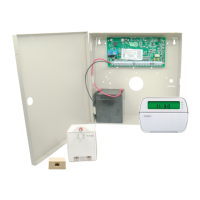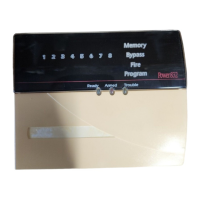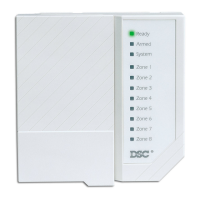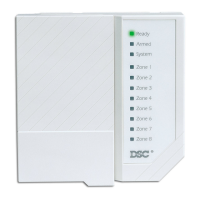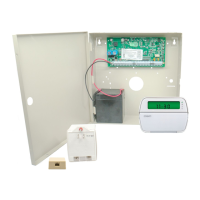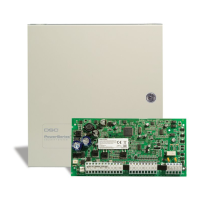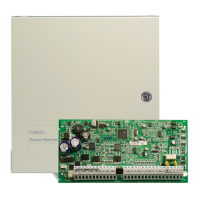What does 'Alt. Comms Fault TBL' mean on DSC PC4020?
- KKevin GonzalesSep 16, 2025
The 'Alt. Comms Fault TBL' means that the DSC alarm control panel can no longer communicate with the central monitoring station.
What does 'Alt. Comms Fault TBL' mean on DSC PC4020?
The 'Alt. Comms Fault TBL' means that the DSC alarm control panel can no longer communicate with the central monitoring station.
What does 'T-Link Network Fault' mean on DSC PC4020 Control Panel?
A 'T-Link Network Fault' indicates a communication problem has occurred between the T-Link and the network.
What does 'T-Link Receiver Trouble' mean on DSC PC4020 Control Panel?
A 'T-Link Receiver Trouble' means that the T-Link module cannot communicate with the receiver on the TCP/IP network.
What does 'Waterflow' mean on DSC Control Panel?
A 'Waterflow' message indicates that the Waterflow zone on a PC4701 Fire Module is open.
What does '2 Wire Smoke' mean on DSC PC4020 Control Panel?
A '2 Wire Smoke' message indicates that the fire zone on a PC4701 Fire Module is open.
What does 'Ground Fault' mean on DSC PC4020?
A 'Ground Fault' message indicates that the earth ground connection is shorted to a positive voltage source or shorted to a non-earth ground potential.
What does 'T = tamper' mean on DSC PC4020?
The 'T = tamper' message indicates that the tamper zone on the module has been activated.
What does 'Battery Trouble' mean on my DSC PC4020?
A 'Battery Trouble' message on your DSC Control Panel indicates that the battery connected to the control panel is low.
What does 'RF Jam Detected' mean on DSC PC4020 Control Panel?
If the DSC Control Panel displays 'RF Jam Detected,' it means that wireless device transmissions are not being received.
What does '4702 AC TBL' mean on DSC Control Panel?
A '4702 AC TBL' message indicates that the PC4702 module has lost AC power.
Monitors fire detection devices and provides a warning alarm if a fire condition is detected.
Capable of transmitting alarms, troubles, and emergency information over telephone lines to a monitoring station.
Explains the meaning of the yellow (trouble) and red (armed) LEDs on the keypad.
Allows reviewing the event buffer on the keypad display for event details.
Programs the system's 24-hour clock by entering 4 digits for hour and minutes.
Programs the system's calendar by entering 6 digits for month, day, and year.
Allows enabling ring detect for 60 minutes for computer calls to the panel.
Resets the main panel by turning off power to the COMBUS for 5 seconds.
Returns to the previous menu or arm/disarm state.
Explains that global keypads belong to all partitions and can be accessed by all users.
Describes accessing the system by entering a valid access code on the keypad.
Details how the system prompts for partition selection and displays status.
Holding the key down for 2 seconds sounds a fire alarm and sends a transmission.
Holding the key down for 2 seconds sends a transmission to the monitoring station.
Holding the key down for 2 seconds sends a transmission or sounds a silent alarm.
Allows selecting zones to be bypassed by pressing the [*] key.
Accesses trouble conditions by pressing [*] then [2], showing a list of issues.
Enters alarm memory mode to view alarms from the last armed period.
Resets smoke detectors assigned to a partition after entering the access code.
Used to program Master Codes and regular access codes for the system.
Starts the user programming command sequence for access codes.
Allows scrolling through access codes by number or using [<] [>] keys.
Presents a menu for editing access codes like programming or erasing.
Accesses user functions menu by pressing [*] then [6] and the access code.
Controls features like Quick Arm, Quick Exit, Auto Arm Control, and Keypad Setup.
Enables arming the panel by entering [*] [0] without disarming.
Allows exiting through delay zones without altering system status by entering [*] [0].
Arms a partition automatically at a programmed time each day.
Allows adjustment of keypad backlighting and display contrast.
Tests system bells for 2 seconds and sends a test code transmission.
Enables or disables the keypad beep for door chime activation.
Enables display of special event messages like 'Fail to Arm'.
Initiates a call to the downloading computer when selected.
Tests detectors on a partition, sounding alarms for violated zones.
Tests detectors locally, sounding the bell for 2 seconds upon violation.
Tests detectors and transmits alarms to the monitoring station.
Disables walk test mode, returning the partition to its normal state.
Exits the walk test menu.
Provides guidance on checking electrical appliances and hazardous materials.
Emphasizes developing and rehearsing escape plans for emergencies.
Lists ASCII characters and their corresponding codes for keypad entry.
| Partitions | 8 |
|---|---|
| Power Supply | 16.5 VAC, 40 VA transformer |
| Input Voltage | 16.5 VAC |
| Keypad Support | Up to 16 keypads |
| Communication Formats | Contact ID, SIA |
| Battery Backup | 12 V |
| Communication | PSTN |
| Weight | 2.3 kg |
